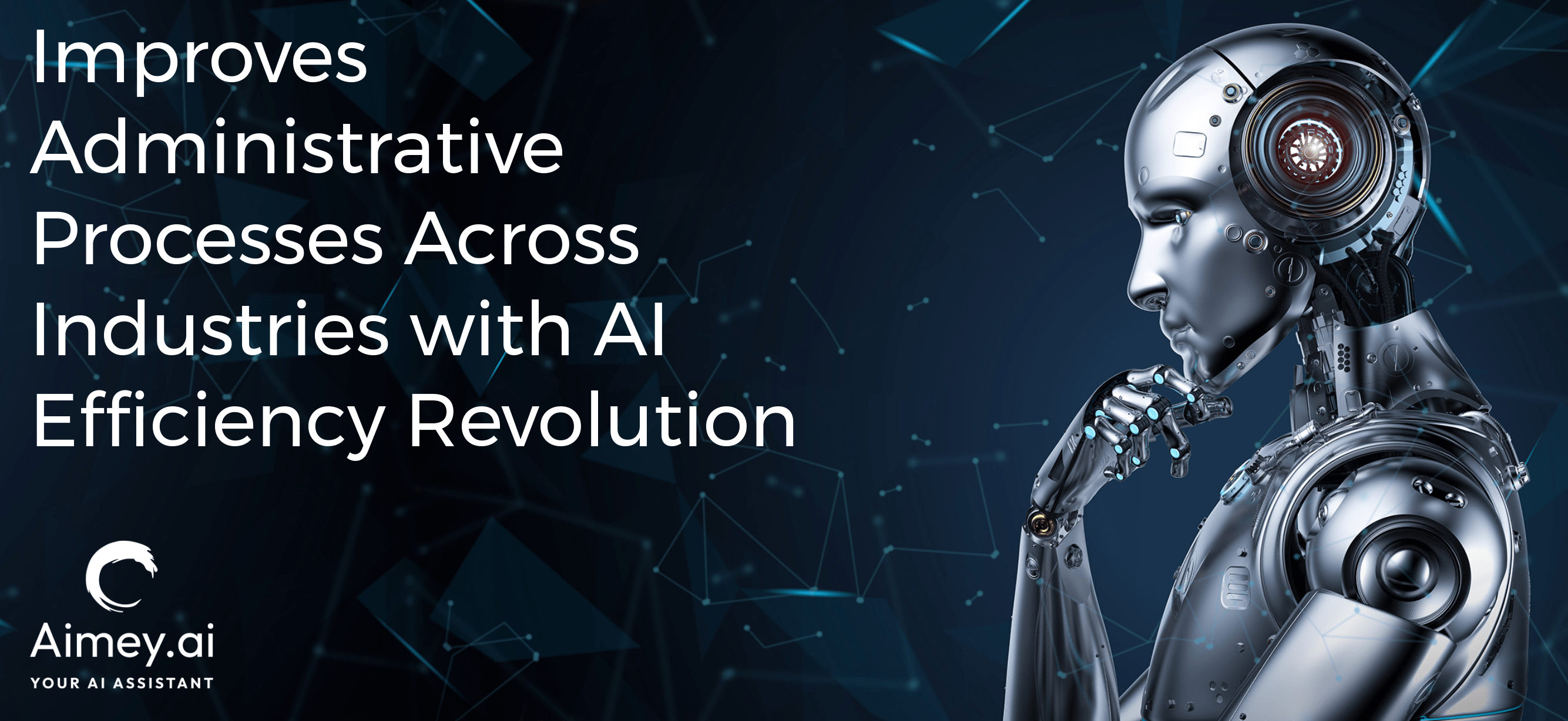Understanding the Scope: What We Mean by ‘Administrative Processes’
Businesses across various sectors are standing on the threshold of a transformative era as Artificial Intelligence (AI) significantly improves administrative processes across industries. Administrative processes encompass a wide range of tasks including data entry, scheduling, communication management, inventory control, and more. These routine activities, although crucial, often consume significant amounts of time and resources. Understanding what falls under administrative processes is essential to appreciate how AI can redefine efficiency.
The Current Scenario: Common Challenges in Administrative Tasks Across Industries
Currently, administrative tasks are often bogged down by manual procedures that lead to inefficiencies and increased operational costs. In many organizations, these tasks are prone to human error, inconsistency, and delays. From healthcare to finance and retail, the weight of inefficient administration can hamper productivity and affect overall service delivery. The repetitive nature of these tasks can also lead to employee burnout, resulting in higher turnover rates and reduced job satisfaction. These challenges underscore the need for technology-driven solutions that can streamline operations and elevate productivity.
A Glimpse into the Future: The Power of AI in Streamlining Processes
The future holds immense possibilities as AI technologies evolve to offer smarter, faster, and more accurate ways of handling administrative duties. AI can automate routine tasks, analyze vast amounts of data in seconds, and provide insights that help in decision-making. For instance, AI-driven tools can manage calendars, process invoices, handle customer inquiries, and even predict inventory needs with high accuracy. By integrating AI into administrative processes, businesses can unlock new levels of efficiency, allowing employees to focus on more strategic activities that drive business growth.
Beyond Traditional Methods: Role of AI in Enhancing Administrative Efficiency
Artificial Intelligence is swiftly revolutionizing how we handle administrative processes across industries. Traditionally, administrative tasks involved a lot of manual labor, from data entry to scheduling and customer service management. These repetitive tasks, although crucial, often lead to human error and inefficiencies. However, AI offers a solution by automating routine tasks, thereby reducing errors and improving accuracy.
AI algorithms can process large volumes of data quickly, enabling real-time insights that were previously unattainable. For example, machine learning models can sort and categorize data with incredible precision, freeing up human resources to focus on more strategic areas. In addition, AI can be integrated with existing systems to provide a seamless workflow, thereby enhancing overall efficiency.
Case Study Review: Examples of How AI Improves Administrative Processes Across Industries
One of the most compelling areas where AI is making a difference is in healthcare administration. Traditionally burdened with paperwork, healthcare systems are now employing AI to manage patient records, schedule appointments, and even handle billing. Johns Hopkins Hospital has implemented an AI-based system to predict patient admission rates, and as a result, has optimized staffing levels, reducing costs and improving patient care.
In the financial sector, AI is utilized for fraud detection, risk management, and customer service. Banks are using AI to automate customer interactions through chatbots, which can handle a multitude of queries in real time. This not only improves customer satisfaction but also reduces the workload on human staff.
Another industry benefiting from AI in administration is human resources. AI-driven platforms are being used to analyze resumes, match job seekers with suitable roles, and even conduct initial interviews. Companies like Unilever have successfully used AI to streamline their recruitment processes, thus ensuring a faster and more efficient hiring cycle.
Making a Positive Impact: The Benefits Of AI-Driven Administration
Utilizing AI in administrative processes across industries brings an array of benefits that cannot be overlooked:
- Increased Efficiency: By automating routine tasks, AI allows for quicker processing times and reduces the likelihood of human error.
- Cost Savings: Automation reduces the need for a large workforce to handle administrative tasks, thus leading to significant cost savings.
- Enhanced Accuracy: AI algorithms are designed to handle data with high precision, ensuring that errors are minimized.
- Better Decision-Making: AI can analyze data to provide actionable insights, aiding in more informed decision-making.
- Improved Customer Experience: With AI handling routine queries, the customer service experience is faster and more reliable.
In summary, integrating AI into administrative functions makes these processes not only faster but also more reliable. As we continue to explore the potential of AI, we can expect even more transformative impacts on administrative efficiency across various sectors.
Did you know? AI can reduce administrative task time by up to 40%. This efficiency boost enables employees to focus on more strategic work and innovation.
Necessary Adaptations: Preparing Your Business for AI Integration
As we stand on the brink of a new era, it’s vital to prepare our business infrastructure for AI integration. This involves understanding our current administrative processes through meticulous analysis. Identifying bottlenecks and inefficiencies early on allows us to create a clear roadmap for AI implementation. Adapting our workforce to work alongside AI is another crucial step. Training sessions, workshops, and continuous learning programs can equip employees with the skills necessary to leverage AI tools effectively.
The Bigger Picture: Long Term Implications of AI in Administration Across Sectors
In the grand scheme of things, integrating AI to improve administrative processes across industries will have substantial long-term benefits. AI offers not only efficiency but also the potential for innovation and creativity by freeing up human resources from mundane tasks. Imagine a world where our administrative aspects are handled seamlessly by intelligent systems, allowing us to focus on strategic growth and innovation. Environmental sustainability is another long-term implication, as AI-driven processes tend to be more resource-efficient.
Embracing Change: Why Now is the Right Time to Invest in AI for Improved Administrative Processes
We stand at a pivotal moment where technology and necessity converge. Never has the potential for AI to improve administrative processes across industries been more evident. As the world becomes increasingly digitized, the risk of falling behind grows. Now is the time to embrace change and invest in AI. Doing so can yield immediate benefits such as cost savings, increased productivity, and enhanced accuracy in our administrative tasks. Additionally, as pioneers in AI implementation, we position ourselves as leaders, attracting talent and fostering a culture of innovation.
To fully grasp how AI can revolutionize our administrative processes, visit aimey.ai and discover more about this transformative technology.
FAQ
What are administrative processes, and how can AI enhance them?
Administrative processes include various tasks such as data entry, scheduling, communication management, and record keeping, which are essential for the functional operations of a business. AI can enhance these tasks by automating routine jobs, analyzing data efficiently, and providing intelligent insights, thus significantly boosting productivity and accuracy. As we integrate these AI systems, we’re shifting towards a more streamlined and efficient administrative landscape.
What challenges do businesses face with current administrative tasks?
Common challenges include handling large volumes of data, maintaining accuracy, ensuring regulatory compliance, and managing repetitive, time-consuming tasks. These challenges often lead to bottlenecks that can affect overall productivity. Fortunately, with the advent of AI, we have the opportunity to overcome these obstacles by entrusting these processes to innovative technologies that can perform such tasks with remarkable speed and precision.
Can you provide a case study where AI has positively impacted administrative processes?
One notable case is in the healthcare industry where AI has been used to streamline patient data management and appointment scheduling. This has resulted in shorter wait times for patients, more accurate medical records, and an overall improvement in the efficiency of healthcare services. This illustrates that, regardless of the sector, AI can be a game-changer in handling complex administrative duties with ease.
What are the long-term benefits of incorporating AI into administrative roles?
By integrating AI into administrative roles, businesses can look forward to not only immediate improvements in efficiency but also long-term benefits such as continuous optimization of processes, enhanced decision-making capabilities, and the ability to scale operations effectively. Moreover, AI can pave the way for sustainable practices by reducing paper usage and energy consumption, thus contributing to environmental conservation.
How should businesses prepare for AI integration?
Businesses must first analyze existing processes to identify areas where AI can provide the most benefit. Following this, they should consider upgrading their technological infrastructure, training staff to work with AI tools, and promoting a progressive workplace culture that embraces digital transformation. By doing so, businesses can ensure a smooth transition to AI-powered processes, ultimately driving innovation and staying competitive in their respective markets.

